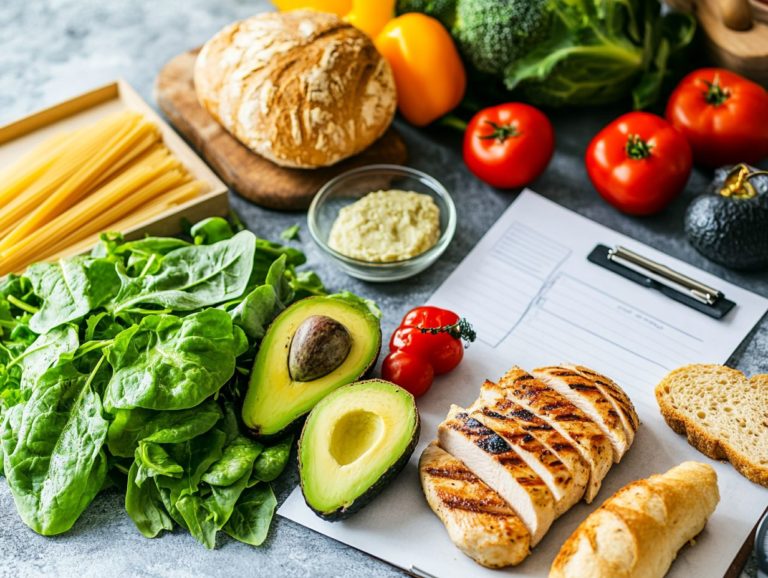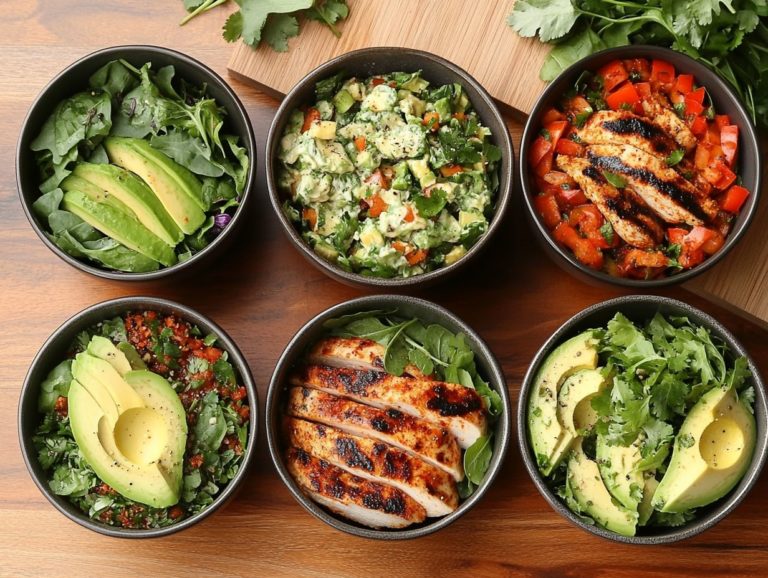Nutrition for Health Conscious People: Day-to-Day Tips
Nutrition is pivotal to your overall health and well-being, impacting everything from your energy levels to your immune function.
Get ready to transform your health! This article guides you in crafting a balanced and nutritious diet that fuels your energy and vitality. You will also learn about superfoods foods that are exceptionally nutritious and beneficial for health and supplements, including their benefits and risks.
You will discover effective strategies to develop healthy eating habits and stay consistent with your nutrition goals. Whether you’re looking to refine your current diet or embark on a new journey toward enhanced health, the insights shared here will empower you to thrive.
Contents
- Key Takeaways:
- Why Nutrition Matters for Health
- Creating a Balanced and Nutritious Diet
- Incorporating Superfoods and Supplements
- Healthy Eating Habits for Optimal Health
- Staying Consistent with Nutrition Goals
- Frequently Asked Questions
- What is the importance of nutrition for health-conscious people?
- How can I incorporate more fruits and vegetables into my daily diet?
- What are some healthy alternatives to processed snacks and sweets?
- How can I make sure I am getting enough protein in my diet?
- What are some ways to stay hydrated throughout the day?
- Are there any specific nutrients that health-conscious people should pay attention to?
Key Takeaways:

- Prioritize a balanced diet with lean proteins, whole grains, and colorful fruits and vegetables.
- Consider superfoods and supplements carefully based on your individual needs.
- Develop healthy habits by practicing portion control and mindful eating.
Why Nutrition Matters for Health
Nutrition stands as a cornerstone of health, shaping not just your physical well-being but also your mental and emotional states. When you prioritize proper nutrition, you bolster your immune system, alleviate stress, and enhance your overall quality of life.
By following dietary guidelines and making informed choices, you can cultivate a balanced diet abundant in essential nutrients while steering clear of pitfalls like added sugars and processed meats.
Experts such as Lauren Manaker and Christa Brown underscore the significance of healthy eating in improving health outcomes, reducing disease risk, and supporting mental well-being echoing the recommendations of respected organizations like the CDC and the World Health Organization.
Creating a Balanced and Nutritious Diet
Creating a balanced and nutritious diet is crucial for your optimal health and well-being. It not only helps maintain a healthy weight but also plays a significant role in preventing chronic diseases.
Integrate a variety of food groups into your meals, including fruits, vegetables, whole grains, and low-mercury fish, to ensure you re getting a rich supply of essential nutrients.
Additionally, meal planning can enable you to make informed choices, steering clear of added sugars and processed meats while fostering a positive relationship with food. By emphasizing the importance of protein sources, healthy snacks, and adhering to dietary guidelines, you can significantly enhance your nutritional quality, ultimately promoting your overall wellness.
Key Nutrients to Include
Incorporating key nutrients into your diet is essential for supporting your body’s functions and overall health. Vital nutrients like antioxidants, omega-3 fatty acids, and proteins play crucial roles in maintaining a robust immune system, promoting gut microbiota diversity, and warding off chronic diseases.
Adding fermented foods to your meals can also enhance gut health, making them a worthy part of your dietary repertoire. By following dietary guidelines and making informed choices, you can ensure that you’re effectively meeting your nutritional needs.
Vitamins and minerals found in fruits and vegetables further bolster your optimal health, aiding in energy production and cellular repair. For example, vitamin C, abundant in citrus fruits, not only supports your immune system but also acts as a powerful antioxidant. Similarly, magnesium from sources like leafy greens and nuts significantly contributes to muscle function and nerve transmission.
To effectively incorporate these essential nutrients, aim to fill half your plate with an array of colorful vegetables and fruits at each meal, ensuring a diverse intake of vitamins and minerals. Choosing fatty fish like salmon a couple of times a week can elevate your omega-3 levels, offering benefits for both heart health and cognitive function.
Meal Planning and Preparation Tips
Effective meal planning and preparation are your secret weapons on the journey to healthy eating and nutrition. When you organize your meals in advance, you enable yourself to make better dietary choices, resist the allure of processed foods, and seamlessly incorporate healthier alternatives into your diet.
Consider strategies like using canned foods for convenience and prepping ingredients ahead of time. Applying research-based guidelines can help achieve a balanced intake. Mindful eating practices allow you to relish each bite and cultivate a more positive relationship with food.
Exploring batch cooking techniques can truly streamline your culinary routine. By preparing larger quantities of meals, you can effortlessly store and reheat them throughout the week, saving you both time and energy.
Why not embrace seasonal ingredients? They not only support local farmers but also enhance the flavor of your dishes, as fresh produce often outshines its out-of-season counterparts.
To minimize food waste, get creative with leftover recipes. Consider composting unwanted scraps, ensuring that every part of your groceries is put to good use.
By practicing mindfulness during meals taking the time to chew and appreciate the flavors you can elevate your overall dining experience, reinforce healthy habits, and foster a deeper connection to your food.
Incorporating Superfoods and Supplements

Incorporating superfoods and supplements into your diet can truly elevate your nutritional intake and bolster your overall health. Superfoods are nutrient-rich foods that offer health benefits, like berries, leafy greens, and foods abundant in omega-3 fatty acids.
These powerhouses offer a range of benefits, from enhancing cognitive function to alleviating inflammation. When considering adding supplements, it s crucial to follow dietary guidelines based on research.
This approach ensures that supplements enhance your balanced diet rather than serve as substitutes for whole foods.
Benefits and Risks of Superfoods
Superfoods present a wealth of health benefits, boasting a rich array of antioxidants and omega-3 fatty acids that can significantly enhance your heart health and reduce inflammation. While integrating these foods into a balanced diet can be advantageous, they are not a panacea. Overindulgence or relying solely on them for your nutritional needs can lead to risks. Sticking to dietary guidelines is key to ensuring superfoods enrich your meals and don t overshadow other important foods.
Take berries, for example. Blueberries and acai are brimming with vitamins and phytochemicals that can boost cognitive function and support cellular health. Leafy greens like kale and spinach are not just trendy; they pack a nutritional punch, offering iron, calcium, and fiber crucial for digestive wellness.
However, experts caution against the temptation to overload on any single superfood, as this can create imbalances and detract from your intake of other vital nutrients. Research underscores the importance of a diverse diet, with the Academy of Nutrition and Dietetics advocating for a colorful plate filled with a variety of whole foods to ensure optimal nutrient absorption and overall health.
Start planning your meals today to reap the health benefits!
Choosing and Using Supplements
Choosing and using supplements wisely can enhance your diet and address specific nutritional gaps, promoting your overall health. Evaluate your dietary needs and determine which supplements may benefit you the most, drawing from evidence-based tips and dietary guidelines.
Remember, quality and sourcing matter greatly. Always opt for reputable brands that have undergone third-party testing to guarantee safety and efficacy.
As you consider your options, think about factors such as your age, lifestyle, and any existing health conditions that could influence your nutritional requirements. Individuals in different life stages often have varying needs older adults typically require more vitamin D and calcium.
Don’t forget to consider dietary restrictions, whether they stem from allergies or lifestyle choices like veganism, when selecting your supplements. Most importantly, consulting with healthcare professionals before adding any new products to your routine is advisable. They can provide personalized recommendations and ensure that the supplements complement a balanced diet.
Healthy Eating Habits for Optimal Health
Adopting healthy eating habits is crucial for achieving optimal health and well-being. This goes beyond selecting nutritious foods; it also includes practices like portion control and mindful eating, which can help you enjoy your food more.
Research indicates that mindful eating not only reduces stress but also fosters social connections through shared meals, enhancing your quality of life. Embracing these practices leads to a fulfilling and enjoyable dining experience.
Portion Control and Mindful Eating
Portion control and mindful eating are essential for cultivating a healthy relationship with food. They enable you to relish your meals while avoiding overeating. By focusing on portion sizes and embracing mindfulness, you can savor each bite, enhancing your dining experience and boosting your emotional well-being.
Mindful eating serves as a powerful tool for stress reduction, allowing you to find joy in your meals and nurture a deeper connection with the food on your plate.
Start by using smaller plates. This simple trick visually persuades your brain that you re satisfied with less food. Remember to slow down during meals; take the time to chew thoroughly and pause between bites to heighten your awareness of flavors and textures, making each meal a true pleasure.
Engage your senses by appreciating the aroma and presentation of your food. These practices help you avoid mindless overeating and foster a positive mindset, promoting emotional stability and reducing stress or anxiety around eating.
Managing Cravings and Indulgences

Managing cravings and the occasional indulgence is crucial for maintaining a balanced diet without feeling deprived. By recognizing your triggers and implementing smart strategies like choosing healthier snacks or practicing moderation you can savor your favorite foods while supporting your health goals. This approach enhances your emotional well-being, providing flexibility and enjoyment that make eating a pleasure rather than a chore.
Understanding the psychological aspects of cravings is vital, as emotional triggers can lead to mindless eating. By pinpointing specific situations or feelings that spark these urges, you can better equip yourself with alternatives, ensuring that a piece of dark chocolate or some fresh fruit can satisfy your cravings without leading to binge-eating.
Incorporating these healthy substitutes into your lifestyle meets your need for comfort while fostering a healthier relationship with food. Striking a balance between indulgence and nutrition lets you enjoy life s pleasures without guilt, creating a harmonious approach to eating that nourishes both body and mind.
Start your journey to better health today!
Staying Consistent with Nutrition Goals
Staying consistent with your nutrition goals is essential for reaping long-term health benefits and maintaining a balanced diet. By adopting effective meal planning strategies and setting realistic targets, you can cultivate a sustainable approach to healthy eating, especially when considering nutrition for plant-based dieters.
Nurturing social connections through shared meals and wholesome eating experiences not only provides motivation but also offers vital support, reinforcing your commitment to your nutritional objectives.
Tips for Maintaining a Nutritious Diet Long-Term
Maintaining a nutritious diet over the long haul demands commitment, flexibility, and tailored strategies that suit your lifestyle. By making healthy eating a priority and incorporating vegan nutrition tips into your routine, you can effectively meet your nutritional needs.
Using research-based tips and fostering social connections through shared meals creates a supportive environment that encourages you to stick to your dietary goals.
To find this balance, consider adding seasonal ingredients and experimenting with new recipes. This not only helps you avoid the dreaded monotony but also sparks creativity in meal preparation.
Engaging your family and friends in the cooking process can transform healthy eating into a communal experience, making it more enjoyable rather than just another chore.
Set realistic goals while allowing for occasional indulgences without the guilt. This provides the necessary flexibility to adhere to your nutritious plan over time. This approach nurtures a positive relationship with food and reinforces accountability among your peers, ultimately promoting long-lasting healthy habits.
Frequently Asked Questions
What is the importance of nutrition for health-conscious people?
Nutrition plays a crucial role in maintaining overall health and well-being for individuals who prioritize their health. A balanced and nutritious diet can help prevent chronic diseases, boost energy levels, and support a strong immune system.
How can I incorporate more fruits and vegetables into my daily diet?

A simple way to increase your fruit and vegetable intake is to aim for at least 5 servings per day. Try adding a side salad to your lunch or dinner, snacking on fruits like apples or bananas, or adding veggies to your morning smoothie.
What are some healthy alternatives to processed snacks and sweets?
Nuts, seeds, and dried fruit are great options for healthy snacking. They provide essential nutrients and are a good source of healthy fats. You can also try homemade energy balls or dark chocolate as a healthier alternative to traditional sweets.
How can I make sure I am getting enough protein in my diet?
Incorporating a variety of protein sources such as lean meats, beans, legumes, tofu, and nuts can help ensure you are meeting your daily protein needs. You can also try adding protein powder to your smoothies or snacks for an extra boost.
What are some ways to stay hydrated throughout the day?
In addition to drinking water, you can also get hydrated through foods such as fruits and vegetables. Herbal teas, coconut water, and infused water can also be refreshing and healthy options for staying hydrated.
Are there any specific nutrients that health-conscious people should pay attention to?
Omega-3 fatty acids, vitamin D, and calcium are important nutrients for maintaining overall health. Incorporating foods like fatty fish, leafy greens, and fortified dairy products can help ensure you are meeting your daily intake of these nutrients.
Start your healthy eating adventure today!






